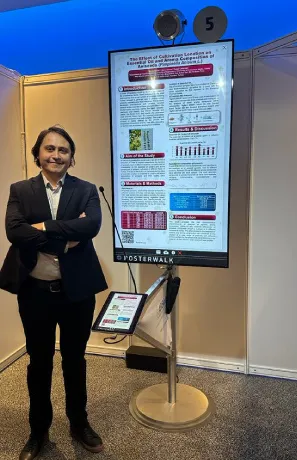- Home
- News About Us
- 2024 AND BEYOND: WHAT ARE WE BEING TOLD?
2024 AND BEYOND: WHAT ARE WE BEING TOLD?
27 February 2024
Doğa Tamer – Sürdürülebilirlik Adımları Derneği
I'm sure we all have different answers to the question of what is the path to solving problems. Because we all have different perspectives on life and the economy. But how can we improve the current economic system, how can we move forward without stealing from the resources of the future? We need to get ourselves in order, so to speak, to answer these questions. No one, no institution, has the luxury of avoiding or not taking on the social, environmental, and economic problems we face.
The current system does not produce enough value to guarantee the future of the world. The value produced is not distributed fairly. While costs continue to rise, we are racing against time to achieve sustainability goals. Therefore, we need a new perspective on capitalism. Within the typical functioning logic of capitalism, prioritizing profit realization in a short time is key. At the beginning of 2020, stakeholders revisited capitalism at the World Economic Forum in Davos. So, what is stakeholder capitalism? It is a system in which companies aim to serve their customers, other companies they are affiliated with, their suppliers, their region, their employees and society. In fact, it's a system that now needs to consider the interests of the planet as well. Companies now need to consider the impact their activities will have on stakeholders, whether it results in harm or benefit, while making profits. Companies that embrace their total impact and see shareholder return as the result of their actions, not as a goal, will win in the future. 2024 will be the year of the sustainability strategy. This applies not only to governments or companies but also to individuals.
The Rise of Renewable Energy
What many scientists around the world say is this: If no steps are taken, especially regarding energy systems, the fires, droughts, floods, hailstorms and tornadoes we have seen in the past few years will increase both in frequency and in severity. Unfortunately, we all now feel the consequences of climate change to the core. The solution to climate change lies in the energy sector because 80% of carbon emissions come from fossil fuels: coal, oil, and natural gas. According to the International Energy Agency's (IEA) World Energy Outlook 2023 report, this percentage will decrease to 73% by 2030.
With the advancement of clean energy technologies, investments have begun to shift in that direction. In 2023, global renewable energy capacity increased by approximately 50%, reaching around 510 GW. This marked the fastest growth rate recorded in the past twenty years. The transition to clean energy technologies not only reduces environmental impacts and improves air quality but also presents new opportunities for jobs and investment. It creates employment in areas such as technology development, manufacturing, assembly, and maintenance, while also enhancing energy security.
The Market Share of Electric Vehicles is Increasing
In recent years, significant changes have occurred in the electric vehicle sector. While in 2019, two out of every 100 vehicles sold worldwide were electric, by 2023, this ratio is estimated to be one out of every five cars. According to Goldman Sachs' forecasts, given the increasing cost efficiency and changing consumer behaviors, global electric vehicle sales are expected to account for half of global new vehicle sales by 2035. As the market expands, prices will continue to decrease, making electric vehicles more affordable for many people.
While debates continue over whether lithium-ion batteries used in electric vehicles pose a new threat to the environment, Japanese manufacturers have announced innovations replacing liquid components with solid materials, while Chinese manufacturers have developed sodium-based batteries. By 2030, faster-charging, longer-range, and cheaper electric vehicles will be introduced to the market.
The Future of Water
With population growth, the climate crisis, and increasing water demands from various sectors, freshwater sources are gradually dwindling and becoming polluted. It is essential to treat water as a limited resource. Today, we see institutions focusing on water solutions such as water reuse, greywater systems, rainwater harvesting, and other sustainable water management practices.
Rainwater harvesting involves collecting existing rainfall to meet water needs throughout the year without requiring significant capital expenditure. In the beginning of 2021, it became mandatory for buildings constructed on parcels exceeding 2,000 square meters to have rainwater collection systems installed.
The Need for Responsible Leaders
Sustainability and eco-conscious thinking and behavior have been a movement for quite some time now. It has gradually become an expression for people, serving as a way for them to convey who they are and their core values. Sustainable and ethical practices are driven by today's youth. The purpose-driven brands they engage with and shop with will also be increasingly in demand.
It's a fact that change can only occur when top management of companies takes responsibility. Leaders can only make it possible if they are aware of the world's problems and understand how their companies can solve some of them. Leaders need to take responsibility for all impacts. Many companies used to think they could outsource their responsibilities, such as in their supply chains. But that doesn't work anymore. They're increasingly held to a higher standard. Leaders need to be bold in setting goals they know are necessary, even if they don't know how to get there.
The world's complex problems are too big for us to solve alone. In order to make a breakthrough, there is a need to establish broader partnerships. Companies that collaborate more with civil society, local governments, and states tend to be more successful and are seen by society at large as responsible entities.




